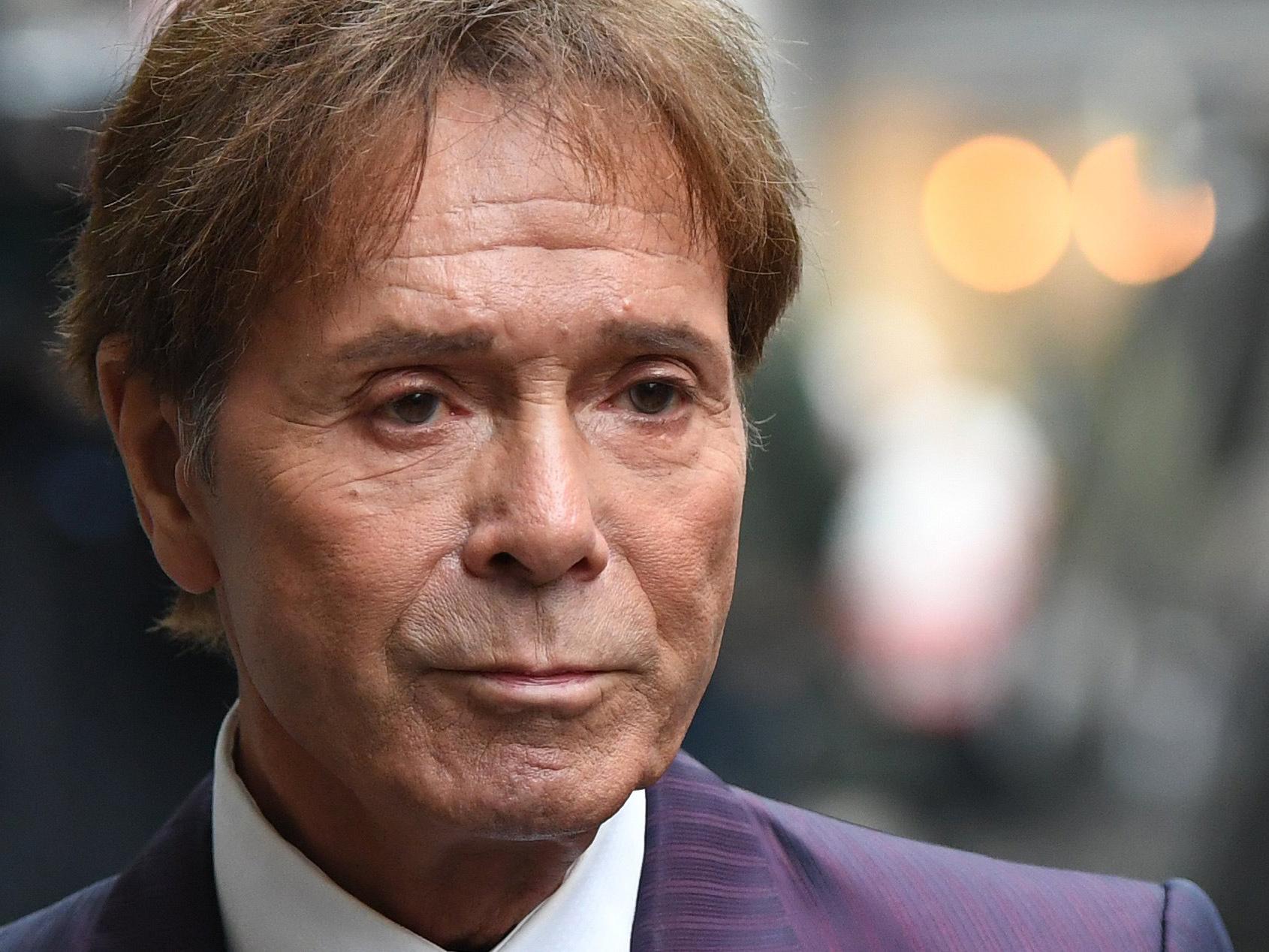Cliff Richard entitled to 'substantial' damages over BBC coverage of police raid, lawyers tell court
Lawyers coverage of sexual assault claims inflicted 'profound and long-lasting damage' on singer

Sir Cliff Richard should receive compensation “at the very top end of the scale” over BBC coverage of a police raid on his home, the singer’s lawyers have told High Court judges.
The coverage, which followed a sexual assault allegation, caused the 77-year-old “profound and long-lasting damage”, his barrister Justin Rushbrooke QC said.
Sir Cliff denied the accusation and was not charged with any offence. He is suing the broadcaster over what his legal team described as a “very serious invasion” of privacy.
BBC editors have said they would defend themselves “vigorously” during a trial, expected to last 10 days, at the High Court in London.
Mr Rushbrooke told Mr Justice Mann that BBC coverage of a search at the singer’s apartment in Sunningdale, Berkshire, in August 2014 had a “prolonged impact” on him.
He did not indicate the total amount Sir Cliff wanted, but said he spent more than £108,000 in “PR fees” in “consequence of the BBC’s unlawful conduct”.
They said he also wanted compensation because a revised edition of his book My Life, My Way had to be shelved.
Sir Cliff, who was abroad when the raid took place, initially sued both the BBC and South Yorkshire Police,
The court heard the singer had already agreed to accept a £400,000 payment from the force in May 2017, as well as covering some of his legal costs.
“We think it is hard to imagine a case of publicity about a suspect in a police investigation which could have caused greater damage to the autonomy and dignity of the claimant, when you look at the prolonged impact it had upon Sir Cliff’s life,” said Mr Rushbrooke.
He added: “We say this is a claim for an award at the very top end of the scale.”
Lawyers have told Mr Justice Mann how, in late 2013, a man made an allegation to London’s Metropolitan Police saying he had been sexually assaulted by Sir Cliff during an event featuring evangelist Billy Graham at Sheffield United’s Bramall Lane football stadium. The accuser said the abuse took place in 1985, when he was a child.
Scotland Yard then passed the allegation to South Yorkshire Police in July 2014.
Sir Cliff denied the allegation and in June 2016 prosecutors announced he would face no charges.
A BBC spokesman has said that the corporation had reported Sir Cliff‘s “full denial of the allegations at every stage”.
They suggested that the journalist who obtained the information must have known that it had been “improperly” released by someone involved in a “highly sensitive” police operation and said the source was “tainted”.
But Mr Rushbrooke said: “In a nutshell, it is Sir Cliff‘s case that the BBC’s coverage of the search was an invasion – indeed a very serious invasion – of his privacy for which there was no lawful justification.
“The fact and the details of the investigation which the BBC published to the world at large, along with the video footage of his apartment being searched, were private information and there was no public interest in the disclosure of this information to the millions of viewers and website readers around the world to whom it was published.
“For strong public policy reasons, persons who are under investigation but have not been charged with any offence should not be publicly named other that in exceptional circumstances – circumstances which were not present in this case.
“Moreover, even if there had been some public interest in the fact that the claimant was under investigation, the way that the BBC went about publishing the ‘story’ was so disproportionate, and so intrusive, as to render it unlawful.”
The BBC got information about the sex assault allegation from a “tainted” police source, Mr Rushbrooke told the court.
The barrister said Sir Cliff was entitled to “very substantial” damages or compensation to reflect the “flagrant way” the BBC went about “breaching his rights”.
He said the corporation had used a helicopter and that the “massive, massive coverage” by the broadcaster and other publications were on any view “hugely intrusive”.
He added: “It is hard to encapsulate in words the sense of panic and powerlessness that must have been induced in him on August 14 2014 when he realised that the BBC were relaying instantaneously and indiscriminately around the world highly sensitive and damaging information concerning himself – all based upon an allegation of serious criminal conduct which he knew to be entirely false.”
Mr Rushbrooke said Sir Cliff had been left with “no option” but to take legal action and told the judge: “What we are talking about is using TV cameras to spy into someone’s home at the time when their target is in the most vulnerable position imaginable and then serve it up to the British public as the most sensational story imaginable.”
He went on: “The coverage had a profound and continuing impact on upon almost every aspect of his life.”
A BBC website article about the police raid was the “most shared article in the world” on the day it was published.
Mr Rushbrooke said Sir Cliff‘s life was put “on hold” and his reputation “very publicly under a cloud” pending decisions by prosecutors.
Subscribe to Independent Premium to bookmark this article
Want to bookmark your favourite articles and stories to read or reference later? Start your Independent Premium subscription today.
